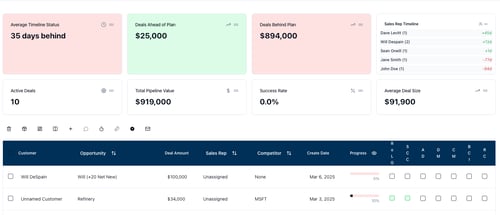Many salespeople and sales executives believe that software price negotiations happen towards the end of the sales cycle as its culmination. Is this the best time for this negotiation? Who has leverage at that point of the sales cycle? These are just a couple of the obvious questions regarding the time and format of price negotiations for enterprise SaaS applications.
So, if price negotiations shouldn't happen at the end of the sales cycle, when should they occur?

The MOIC Sales Engine is very instructive on this matter, as its premise is that the business case drives the likely success/failure of the sales cycle. For example, the business case needs to be driven by the unique capabilities of our product, so that we are not doing the business case for our competitors at the same time. The MOIC Sales Engine process indicates that the business case is done at the very beginning of the sales cycle (before much effort has been applied, as it is the business case that is going to determine how much effort should be applied to a given sales situation).
More specifically, the business case discovery and delivery serves as an opportunity to negotiate the likely software license price in conjunction with the specific value that the software is providing. Competitors' prices become irrelevant if the business case leverages our unique capabilities to deliver value. After all, what difference does it make if our software costs $100,000 more than our competitor, if it only has the critical and unique capability to drive $2 million of superior business value?
Conversely, the competition could be free of charge and it shouldn't matter, because they lack the unique capabilities needed to drive the business value identified in the business case. Once a competitor has been devalued to the point that "free" is "too expensive", the winner of the software sweepstakes becomes automatically determined.
Therefore, the pricing leverage swings toward the vendor that can create, negotiate and deliver the highest value through their unique capabilities. When the business case is developed and delivered before much of the sales effort has been expended (before delivering even a pricing range or before the custom demo, for example), the software vendor has the pricing leverage, as the price should appear to be trivial when weighed against the value that will be delivered.
However, if the pricing discussion occurs after the sales effort has been expended, the pricing leverage swings massively toward the customer — which drives the software price down.
So which position would you prefer: negotiating the price as compared to the likely value produced early in the sales cycle (keeping the license price up) and merely proving it during demos and references, or after spending tremendous resources during a sales process only to get hammered on price late in the sales cycle? Delivering the business case early also has the side effect of faster disqualification of sales cycles that will not likely be won (or be worth winning), thus optimizing resources for the deals that have been properly vetted through the "business case early" sales methodology.
If your sales organization struggles to leverage the business case method to determine on which deals to expend sales resources, maximize win rates and reduce discounting, please ask
Virtual Dave or email
dave@moicpartners.com for direction.
 The MOIC Sales Engine is very instructive on this matter, as its premise is that the business case drives the likely success/failure of the sales cycle. For example, the business case needs to be driven by the unique capabilities of our product, so that we are not doing the business case for our competitors at the same time. The MOIC Sales Engine process indicates that the business case is done at the very beginning of the sales cycle (before much effort has been applied, as it is the business case that is going to determine how much effort should be applied to a given sales situation).
The MOIC Sales Engine is very instructive on this matter, as its premise is that the business case drives the likely success/failure of the sales cycle. For example, the business case needs to be driven by the unique capabilities of our product, so that we are not doing the business case for our competitors at the same time. The MOIC Sales Engine process indicates that the business case is done at the very beginning of the sales cycle (before much effort has been applied, as it is the business case that is going to determine how much effort should be applied to a given sales situation).



